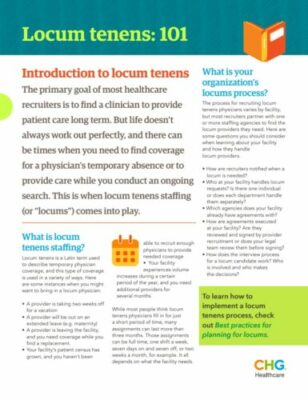
The primary goal of most healthcare recruiters is to find a clinician to provide patient care long term. But life doesn’t always work out perfectly, and there can be times when you need to find coverage for a physician’s temporary absence or to provide care while you conduct an ongoing search. This is when locum tenens staffing (or “locums”) comes into play.
What is locum tenens staffing?
Locum tenens is a Latin term used to describe temporary physician coverage, and this type of coverage is used in a variety of ways. Here are some instances when you might want to bring in a locum physician:
- A provider is taking two weeks off for a vacation
- A provider will be out on an extended leave (e.g. maternity)
- A provider is leaving the facility, and you need coverage while you find a replacement
- Your facility’s patient census has grown, and you haven’t been able to recruit enough physicians to provide needed coverage
- Your facility experiences volume increases during a certain period of the year, and you need additional providers for several months
While most people think locum tenens physicians fill in for just a short period of time, many assignments can last more than three months. Those assignments can be full time, one shift a week, seven days on and seven off, or two weeks a month, for example. It all depends on what the facility needs.
What is your organization’s locum tenens process?
The process for recruiting locum tenens physicians varies by facility, but most recruiters partner with one or more staffing agencies to find the locum providers they need. Here are some questions you should consider when learning about your facility and how they handle locum providers:
- How are recruiters notified when a locum is needed?
- Who at your facility handles locum requests? Is there one individual, or does each department handle them separately?
- Which agencies do your facility already have agreements with?
- How are agreements executed at your facility? Are they reviewed and signed by provider recruitment, or does your legal team review them before signing?
- How does the interview process for a locum candidate work? Who is involved, and who makes the decisions?
To learn how to implement a locum tenens process, check out Best practices for planning for locum tenens.
How do you find a locums agency?
If your facility has worked with locums in the past, it’s likely that you already have existing contracts with staffing agencies. You will want to review those partnerships and decide if you would like to keep working with all of them, find new agencies, or pare down the number you regularly work with.
Here are some other things to consider when choosing a staffing agency:
- What’s the experience of the agency?
- What is the ability of the agency to deliver on its promises?
- How much experience do the agency’s representatives have?
- How much do the agency’s services cost?
- What is the quality of providers?
- How does the agency report on progress for open searches?
To help determine which agencies to work with, review the Recruiter’s guide to choosing a staffing agency.

What information do you need to collect?
When you are ready to engage an agency in a search for a locum, it is important to collect all the necessary information so you can find the right provider. Many agencies will have certain pieces of information they want every time—and this information is typically similar across agencies. The more details you can provide about your needs, the easier it will be to find good candidates.
Here are some pieces of information you should have before you contact an agency about a locum need:
- Provider specialty
- Is the locum replacing an existing provider?
- Pay rate or range
- Number of patients to be treated
- Is call required?
- Where will the provider be located? At one facility or multiple?
- What kind of equipment will the provider be using?
- What kinds of procedures will the provider be required to perform?
- What are the EMR and documentation requirements?
- What are credentialing requirements and timelines?
Each agency will require slightly different kinds of information, but having a good understanding of your facility’s needs at the beginning of the search will help the agency find suitable candidates more quickly. It will also require less back-and-forth communication.
How do you screen the candidate applications you receive?
After submitting your request for a provider to the agency, you will begin receiving eligible candidates. This is the time to screen them and ensure they meet all your qualifications.
You will want to review:
- Education, training, and career history
- Licenses and certifications
- Malpractice history
- Recent references
Once you have confirmed the candidate has the skills and background you are looking for, you can schedule an initial screening call. During this time, you will want to confirm the candidate’s:
- Qualifications
- Ability to fit in with the team and the organization
- Desire to be part of the team and perform the required procedures
- Understanding of the assignment’s scope and the practice’s expectations
Be on the lookout for red flags, such as candidates who do not seem like team players, who provide vague or unclear answers to your questions, or who are not well-practiced in the skills you are looking for. It can be useful to develop a screening tool for locum candidates, so you have a consistent and equitable selection process.
What else do you need to know?
Understanding locum tenens contracts and the credentialing process are also crucial parts of effectively getting locums on assignment.
Locum tenens contracts
There are two main parts of a locum contract:
The master agreement is a contract between your organization and the staffing agency. It sets the terms by which the two entities will conduct business and outlines the responsibilities of each party. There is usually no financial commitment associated with this agreement, and you can sign agreements with multiple agencies.
The confirmation letter details the commitments between your organization, the agency, and the provider. It outlines the specific details of an assignment, including the work dates, worksite, and the provider’s compensation. You will need to complete a new confirmation letter every time you confirm a provider for an assignment.
Credentialing
Any credible locums staffing agency will pre-screen candidates before sending them to you for consideration. You can ask your agency about their specific process, but typically they will credential providers to JCAHO standards for their own malpractice coverage.
Many of the documents required are things that your organization will need for credentialing, and the agency will often share this information with you—they will even serve as a liaison between you and the provider to ensure your organization gets what it needs. The agency will also assist you with gathering all required materials needed for provider privileging.
For more detailed information on the credentialing process, review Credentialing with confidence.
Staffing locum tenens providers
As a recruiter, hiring locum tenens is much different than hiring a staff provider. You will need to work closely with your organization to determine your needs, as well as the agency to find quality candidates. You will also need to understand locum contracts and the credentialing and licensing process for temporary providers. While it can seem overwhelming at first, hiring locums gets easier over time—especially when you have a strong agency partnership.
Download the Locum Tenens: 101 guide by clicking the image below:

CHG Healthcare can help you find the doctors, advanced practice, and allied professionals you need to staff your facility. To learn more about our staffing solutions, give us a call at 866.588.5996 or email ecs.contact@chghealthcare.com.